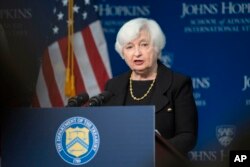U.S. Treasury Secretary Janet Yellen is set to travel Thursday to China to meet with senior officials in the latest effort to address strained relations between the two countries.
The Treasury Department said in a statement earlier this week that Yellen's visit would occur through Sunday and follows a directive from President Joe Biden to deepen communications on various issues, including financial developments and the global macroeconomy.
"While in Beijing, Secretary Yellen will discuss with [Chinese] officials the importance for our countries — as the world's two largest economies — to responsibly manage our relationship, communicate directly about areas of concern, and work together to address global challenges," the statement said.
A senior Treasury Department official told reporters Sunday that the United States wants a healthy economic relationship with China and that fully halting trade and investment "would be destabilizing for both our countries and the global economy."
Yellen's visit follows Secretary of State Antony Blinken's trip to China last month in which he and President Xi Jinping agreed to stabilize U.S.-China relations and ensure that areas of disagreement do not turn into conflict.
But some U.S. analysts are skeptical of any U.S.-Chinese advances stemming from Yellen's trip to Beijing, citing China's decision in recent days to restrict the export of two metals used in semiconductors and solar panels.
Thomas Duesterberg, a senior fellow at the Hudson Institute, a Washington think tank, told VOA's Mandarin Service, "The new Chinese export restrictions are a violation of [World Trade Organization] commitments and a serious escalation of tensions at a time when Xi's charm offensive is trying to win back American investment and trade opportunities."
He added, "The restrictions on these rare earths will hurt not only the semiconductor industry, but also the laser technology and LED industries in the West."
The United States and China are the world's two largest economies and set new bilateral trade records in 2022. However tensions over trade and security remain significant. The United States has placed export controls on high-tech products and imposed economic sanctions against senior Chinese officials accused of abuses. Last week, China announced a new counterespionage law that could pose threats to foreign businesses.
William Yu, an economist at the University of California in Los Angeles, told VOA "China would like to persuade the U.S. to abandon its past policies, but of course, Yellen will not accept it. So, I think the chance of achieving specific results that both sides can agree on may not be high."
"China's economy is currently facing significant challenges," he said, "and there is a strong desire in China for Western countries to reinvest in China, engage in business activities, and resume purchasing Chinese products as they did in the past. Ideally, the removal of all sanctions would be preferable."
A senior Treasury official said Yellen plans to discuss U.S. concerns about a new Chinese counter-espionage law.
"We have concerns with the new measure, and how it might apply, that it could expand the scope of what is considered by the authorities in China to be espionage activity," the official told Reuters, citing possible spillovers to the broader investment climate and the economic relationship.
Yellen addressed U.S.-China relations during an April speech at Johns Hopkins University, saying it would be healthy to have a relationship that fosters growth and innovation in both countries.
"A growing China that plays by international rules is good for the United States and the world," Yellen said. "Both countries can benefit from healthy competition in the economic sphere. But healthy economic competition — where both sides benefit — is only sustainable if that competition is fair."
Yellen also said that for the sake of global stability, the United States and China should cooperate "on the urgent global challenges of our day."
VOA's John Xie and VOA's China Branch contributed to this report. Some information for this story came from The Associated Press, Agence France-Presse and Reuters.






